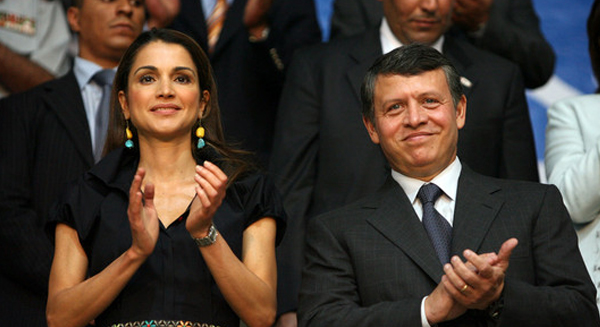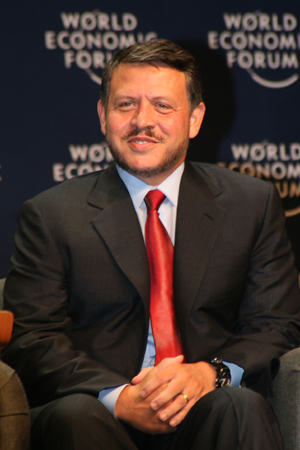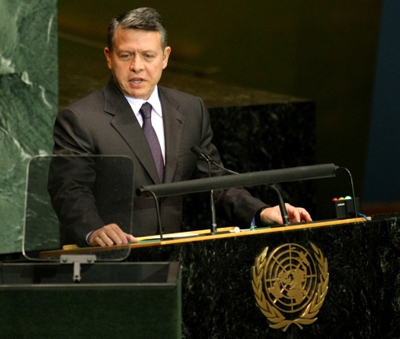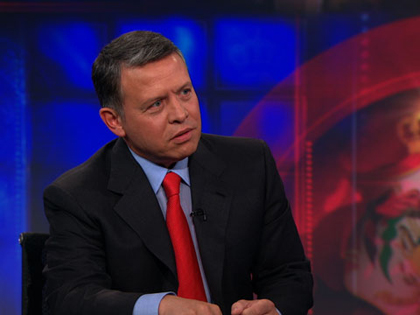The Royal Couple – King Abdullah II
All politics and economics in Jordan today are dominated by the popular and charismatic personalities—and dynamic “hands-on” personal leadership—of Jordan’s ruling couple.

Economy and Politics in Jordan Today
1. The Royal Couple
All politics and economics in Jordan today are dominated by the popular and charismatic personalities—and dynamic “hands-on” personal leadership—of Jordan’s ruling couple, King Abdullah II and his wife, Queen Rania. No aspect of the Jordanian economy can be appreciated without understanding their personal roles. ·
Abdullah II’s Personal Role in Opening Jordan to International Markets
Upon Abdullah II’s accession to the throne in 1999, he enthusiastically took up King Hussein’s dream of opening Jordan to world trade.
In 2000, he achieved the first fruits of that policy with Jordan’s admission to the World Trade Organization (WTO); and by signing the first (among Arab nations) Free Trade Agreement (FTA) with the United States.
This was followed up in 2001 with a partnership agreement with the EU, which ripened into “advanced status” in 2010, which means that Jordan is on tack to achieve full economic integration into the EU as early as 2011.
Abdullah II has also made FTA’s and cooperation agreements the cornerstone of his dealings regionally.
As a result, Jordan has more free trade agreements than any other Arab state. It has also become the most open and investor-friendly of Arab states.
The best statement of Abdullah II’s personal leadership role in opening Jordan to fee trade is by Bassem Faradj, Secretary General of the Amman Chamber of Commerce and CEO of Arab Technical Group:
Secretary General of the Amman Chamber of Commerce,
Bassem Faradj
Jordan can offer a lot as far as the business environment is concerned because of our leadership. Our king has been adamant about putting Jordan on the political and economic map of the world.
“Jordan can offer a lot as far as the business environment is concerned because of our leadership.· Our king has been adamant about putting Jordan on the political and economic map of the world.· This required gallant decisions like working in a free market economy and being open to the rest of the world, and because of this we have signed free-trade agreements with the US; [which] is attractive for other countries interested in investing in Jordan.·
At the end of this year we are working on similar agreements with Canada, Turkey, Singapore, and an association agreement with the EU.· Jordan has great potential when you consider it has opened itself up to one billion consumers by having agreements with these markets.· The Greater Arab Free Trade Agreement is also beneficial to the business climate here because it links 17 countries for trade and this provides opportunity for products produced in Jordan.”
Abdullah II’s Personal, Hands-On involvement in the Economy
From the moment he became King, Abdullah II has not been shy about injecting himself, his ideas, and his personal leadership into shaping—encouraging, spurring, even prodding—every facet of the economy to enter the international economy in order to export services and provide employment for Jordanians. Abdullah’s basic ideas are four simple principles:
1. “The ability to see the path ahead, starts with understanding where we are.”
2. “Lacking naturally recoverable resources, Jordan must develop the only resource it has, which is the talents of our people.”
3. “Growth economies began with an investment in human capital: education, health, and innovation, where excellence is rewarded and new knowledge put to work for the economy,”
4. “Dynamism is the means to economic success, not its end. Dynamism is the very engine that drives economies forward. And like a locomotive engine, if it is to pull all society, it must be linked to every car in the train.”
Abdullah II has personally intervened in many different sectors of the economy in order to spur them to meet and excel international standards. The result is that many Jordanian businesses have so developed that they have become regional leaders in exporting services to international markets.
At this point, let us cite just one example. Shabib Ammari, Chairman of Jordan Telecom Group, credits Abdullah II with spurring the ICT sector in Jordan to become a major regional exporter of services:
Minister of ICT,
Marwan Junaa
ICT sector grew from about 4000 employees and zero exports in 1999 to over 70,000 employees and 250 million dollars in exports in 2009.
“His Majesty King Abdullah constructed a vision that the Jordan economy must be transformed into a knowledge-based economy. The presence of his political leadership made it an incentive to push players to develop. I am very pleased to report that the King personally…is very involved.”
As a result of the King’s personal intervention, according to
Marwan Junaa, Minister of ICT, the ICT sector grew from about 4000 employees and zero exports in 1999 to over 70,000 employees and 250 million dollars in exports in 2009.
Abdullah II has exerted the same personal leadership in a multitude of other sectors, including energy, education, health, ICT, aircraft, and tourism, each of which shall be discussed individually in the Sector Analyses below.
Abdullah II’s Role as Spokesman for Peace and Regional Cooperation
Abdullah II has been become known as the most passionate and articulate spokesman for resolution of the Israeli-Palestinian conflict. His basic positions presented to almost every world leader and world audience have been:
1. The Arab-Israeli conflict has been a central cause of instability and a recruiting ground for extremism and global terror. It has caused untold suffering and injustice.”
2. “I say:’ enough.’ And I am not alone. Palestinians and Israelis, Arabs and non-Arabs, East and West, yearn for an end to this destructive conflict. It is time for us to create a new mindset and a real peace.”
3. “The Arab-Israeli conflict has been my region’s major obstacle to development and reform.”
4. “By all rights, the Middle East should be thriving. Our [region] is a dynamic world of youth, where sixty percent of the people are under the age of 25. We have a rich heritage of scholarship, culture and faith.We have great economic potential. Our region as a whole holds more than 65 percent of the world’s proven oil reserves and 36 percent of gas reserves. Arab countries that do not have these natural resources have a tremendous talent pool of human capability and determination. Yet the plain fact is, economic development has not measured up to the promise. All 22 Arab states combined have a GDP less than that of Spain.”
As a result, almost all Jordanians, Palestinians, and other Arabs, especially Arab leaders, are pleased to have Abdullah II as their most articulate spokesman.
In Abdullah II’s address to the United Nations on September 23, 2010, he added a note of urgency, warning that the failure of the settlement talks now taking place in Washington are likely to result in spreading instability and violence in the Middle East—and soon—unless a resolution· of the conflict is reached.
He has been assiduous in visiting foreign capitals to take that message to world leaders, to myriad international meetings and conferences, and to all diplomats and dignitaries passing through Amman. 
Abdullah II has also taken this message to Western public audiences, as demonstrated in his recent televised appearance on the Jon Stewart Show in the United States where he was granted the unusual privilege of an extended interview.
In addition to the millions who watched the live show, the online video of the extended interview has been seen around the world over 283,000 times. (See http://www.truth-out.org/king-abdullah-ii-jordan-hopes-middle-east-peace-video63553 for videos both the initial and extended interview.)
Abdullah II is undoubtedly the most well-known, liked, respected, and admired Middle Eastern national leader—by Arabs, Israelis, and Westerners alike.